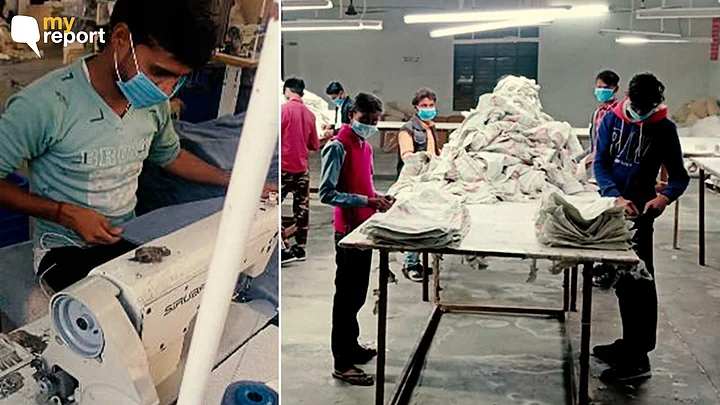Panipat, the cast-off capital of the world that processes over 1 lakh tonnes of global textile waste and serves as a hub for the 'shoddy yarn' industry, is facing an existential crisis after Donald Trump raised tariffs on Indian imports to 50%.
The US President's move has effectively pushed us out of the competition to export our goods to America.
In Panipat, there are more than 400 exporters like me, and the textile industry employs approximately 8 to 10 lakh people. This entire system has been disrupted because of the tariff war.
My factory, where we produce bedsheets, mats, carpets, cushion covers, and more, employs around 100 workers. They work on a piece-wage system, which means they are paid based on the number of units they produce.
Right now, we don’t have any new orders, and even the old ones have been put on hold by our clients. Now that we don't have work, the livelihood of my workers is at stake.
And it’s not just my 100 workers who are affected. The spinning yarn manufacturers, from whom we buy yarn, whether it’s the local Panipat spinning mills or suppliers from Ahmedabad, Surat, Ludhiana, Tirupur and other cities, are all affected.
This entire supply chain, which includes dyers, weavers, and packers, has seen work dry up. Many exporters like me, who rely almost entirely on the US market—where 60-70 percent of my exports are sent—are now practically at a standstill
'Relaxation on Import Duties Not Enough'
On 28 August, the government announced that they have exempted import duty on cotton until 31 December 2025. But this exemption won’t help us much, as it will reduce raw material costs by 3-4 percent at best.
The government is also advising exporters like us to explore other markets. But finding a new market isn’t easy. We can partially offset our losses through other markets, but compensating for such a huge volume is simply not possible.
The government should understand that the US market cannot be replaced overnight. Exploring a new market requires travelling to new countries, finding new clients, and understanding and researching the market. All this requires a significant amount of time and investment.
'The Crisis Can Be Handled in A Better Way'
A multi-dimensional approach by the government is required to solve this crisis. Of course, the primary way of solving the crisis is working out through diplomatic channels, but if that's taking time, which workers and labourers don't have, then the government should explore other options.
The first step should be to immediately open the emergency credit line to overcome the liquidity shortfall. We should be provided with interest-free loans, until the crisis is resolved, to maintain adequate liquidity.
At this point, re-implementation of the Interest Equalisation Scheme is crucial. Introduced by the government in 2015, the scheme provided interest rate subsidies on pre-shipment and post-shipment export credit for textile exporters. However, it was discontinued on 31 December 2024. The government should consider reviving it.
We face cut-throat competition from other markets such as China, Bangladesh, Pakistan, Vietnam, Sri Lanka, and Türkiye. So, for us to be able to compete with them, the government should increase the subsidy drawbacks, i.e. the reimbursement of taxes paid by the manufacturers on raw materials, fuel, packing material, and so on.
Even if the talks don't reach a fruitful solution, by providing these supports, the government would at least make us strong enough to compete with our competitors.
I hope the government acts before it’s too late, because behind every factory shuttered in Panipat are thousands of families struggling to survive. The livelihoods of lakhs are at stake, and with each passing day, the fear of losing everything grows heavier on our hearts.
(In a statement on 7 August, the Ministry of External Affairs had said, "It is extremely unfortunate that the US should choose to impose additional tariffs on India for actions that several other countries are also taking in their own national interest. We reiterate that these actions are unfair, unjustified and unreasonable. India will take all actions necessary to protect its national interests.”)
(All 'My Report' branded stories are submitted by citizen journalists to The Quint. Though The Quint inquires into the claims/allegations from all parties before publishing, the report and the views expressed above are the citizen journalist's own. The Quint neither endorses nor is responsible for the same.)
